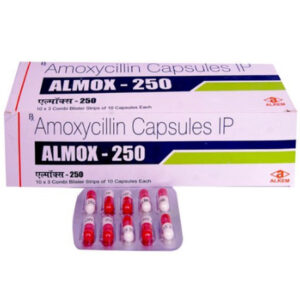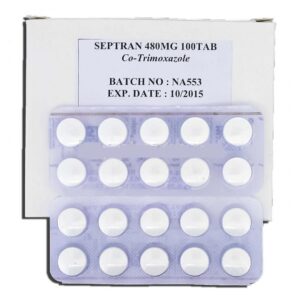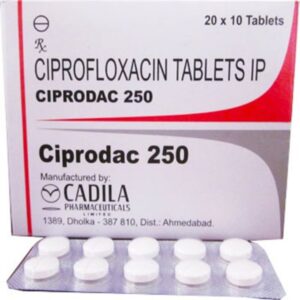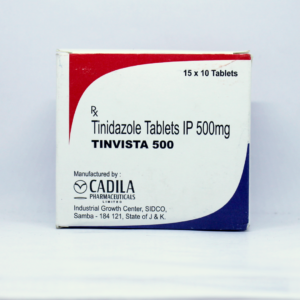About Dee X 1
Dee X 1 belongs to a group of medications called tetracycline antibiotics, used to treat bacterial infections. Dee X 1 treats urinary tract infections, intestinal infections, respiratory infections, eye infections, sexually transmitted infections (like gonorrhea, syphilis), gum infections, and diseases (like periodontitis), and others. Besides this, Dee X 1 also treats acne-like lesions caused by rosacea. However, it does not treat facial redness caused by rosacea.
Dee X 1 being an antibiotic prevents the growth of bacterial cells (the bad ones!) by preventing the formation of the outer protein layer of bacteria (cell wall) responsible for bacteria’s growth and multiplication. It is a broad spectrum antibiotic, i.e. it acts against a wide variety of bacteria. It is a bacteriostatic antibiotic i.e. it stops the growth of bacteria but necessarily does not kill them.
Dee X 1 should only be taken if advised by your doctor. It can be taken with or without food but should be consumed at a fixed time for the best results. The course of Dee X 1 should be completed as prescribed by your doctor for better results. Some common side effects of Dee X 1 are nausea (feeling or being sick), vomiting, diarrhea etc. Please consult your doctor if these side effects become troublesome.
Dee X 1 is pregnancy category D (high risk) medicines so its use in pregnant and nursing mother is not recommended. Use of Dee X 1 during tooth development (last half of pregnancy, infancy, and childhood up to the age of 8 years) may cause staining of teeth (yellow-grey-brown). Do not consume alcohol as it may cause excessive drowsiness when taken along with Dee X 1 . Before using Dee X 1 tell your doctor if you ever had an allergy to Dee X 1 , have kidney problems, liver problems, swollen food pipe (esophagitis) or muscle disease (myasthenia gravis). Do not drink alcohol with Dee X 1 as it may increase the unpleasant side effects like drowsiness and dizziness.
Uses of Dee X 1 : Bacterial infections: Acne

Medicinal Benefits
Dee X 1 is a type of tetracycline class of antibiotic which is effective against a wide range of bacteria including gram-negative, gram-positive bacteria, anaerobes, and some parasites. It is prescribed for the treatment of various bacterial infections of the respiratory tract (influenza, pneumonia), genitourinary area (syphilis, gonorrhea), anthrax infection, sinuses, and eye, skin. Besides this, it is also indicated in the tick-borne infections (typhus fever) caused by the Rickettsia group of bacteria like typhus fever. Off label, usage includes the prophylaxis or prevention of malaria in the prone area and for the treatment of acne. Sometimes your doctor might prescribe you Dee X 1 as an alternative medicine to penicillin when penicillin is contraindicated.
Directions for Use
Take Dee X 1 as advised by your doctor. Preferably take it empty stomach. Swallow it as a whole with plenty of water, do not chew or crush it. If gastric irritation or stomach upset becomes troublesome, you may take it with meals and speak with your doctor regarding use of an antacid. Do not consume dairy products like milk, cheese, yogurt etc with Dee X 1 as it decreases its absorption from the stomach.
Storage
Store in a cool and dry place away from sunlight
Side Effects of Dee X 1
Every medicine has got some side effects. Dee X 1 also has some side effects which may occur in the early days of the treatment, but get better after some time. Common side effects of Dee X 1 include nausea (feeling sick), vomiting, diarrhea. These side effects are temporary and may resolve over time. If these side effects are persistent or are troublesome, speak with your doctor.
Drug Warnings
Iron and antacid (like magnesium hydroxide and aluminum hydroxide) may bind to Doxycycline in the gastrointestinal tract, lowering its efficiency. So, a gap of at least 2 hours should be maintained between intake of Doxycycline and iron supplements and antacids. Prolonged use of Doxycycline during tooth development (last half of pregnancy, infancy, and childhood to the age of 8 years) may cause permanent discoloration of the teeth (yellow-grey-brown). Besides this, in some cases, the use of Doxycycline causes antibiotic-associated diarrhea. Doxycycline may cause sensitive skin to sunlight and ultraviolet rays causing exaggerated sunburn reaction. Hence it is advisable to apply sunscreen before going outside. Its use has also been associated with an increased risk of fungal skin infection like (vaginal candidiasis – thrush). Tetracycline and Doxycycline can form a stable calcium complex in bone-forming tissue thereby affecting the growth of fibula bones in young children and bone development in the foetus. The use of a Doxycycline with isotretinoin should be avoided as it has been reported to cause pseudotumor cerebri (increased pressure inside the brain). Long term use of Doxycycline may affect your blood, kidney, and liver health, so yearly diagnostics test of these parameters is recommended. Doxycycline does not completely prevent malaria caused by P. falciparum as a Doxycycline is given only for the prophylactic regimen (protection) whenever anyone enters into a malaria-prone area.
Drug Interactions
Drug-Drug Interaction: Doxycycline is contraindicated in persons who have shown hypersensitivity to any of the tetracycline or penicillin, retinoid medications taken by mouth (such as acitretin, isotretinoin), blood thinners (such as warfarin), heart disease medicine (digoxin), anti-seizure medications (such as phenytoin, carbamazepine), antacids (especially those containing aluminum, calcium, or magnesium, bismuth subsalicylate), iron supplements, and oral birth control pills.
Drug-Food Interaction: Food containing calcium, iron should be avoided within 2 hours of Doxycycline as it may affect Doxycycline effectiveness. Avoid alcohol intake as it may lead to drowsiness and effect Doxycycline absorption.
Drug-Disease Interaction: Doxycycline should not be given to people with kidney problems, liver problems, swollen food pipe (esophagitis), lupus disease (an autoimmune disease), muscle disease (myasthenia gravis).
Safety Advice
ALCOHOL
Doxycycline should not be taken until prescribed if you are taking alcohol. Keep your doctor informed if you drink alcohol.
PREGNANCY
Doxycycline is a Pregnancy Category D. There are no adequate and well-controlled studies on the use of doxycycline in pregnant women. In some cases, taking Doxycycline during pregnancy may affect tooth and bone development in the unborn baby. So, if you are pregnant or planning for pregnancy contact the doctor before using a Doxycycline .
BREAST FEEDING
Doxycycline is excreted in the breast milk however, the extent of absorption of Doxycycline , by the breastfed infant is not known. Hence, the nursing mother before using a Doxycycline should contact the doctor.
DRIVING
The effect of doxycycline on the ability to drive or operate heavy machinery has not been fully studied but there is no evidence to suggest that doxycycline may affect the ability to drive. Discuss with your doctor if you have any concerns or are having unusual sleepiness or drowsiness after taking Doxycycline .
LIVER
Doxycycline to be taken with caution, especially if you have a history of liver diseases/conditions. Dose may have to be adjusted by your doctor.
KIDNEY
At the recommended doses, Doxycycline is safe to use in patients with kidney disease and no dose adjustment is warranted. If prescribed by a doctor, Doxycycline can be safely used. But it is best to discuss with your doctor if you have a known kidney disease/condition.
Habit Forming : No
Diet & Lifestyle Advise
Probiotics should be taken after taking full course of Doxycycline in order to restore some of the healthy bacteria in the intestines that may have been killed. Taking probiotics after antibiotic treatment can reduce the risk of antibiotic associated diarrhea. Certain fermented foods like yogurt, cheese, sauerkraut, kombucha and kimchi can help to restore the good bacteria of intestine.
Include more fiber enriched food in your diet, as it can be easily digested by your gut bacteria, which helps stimulate their growth. Thus, fiber foods may help restore healthy gut bacteria after a course of antibiotics. Whole grains like whole grain bread, brown rice should be included in your diet.
Avoid taking too much of calcium, iron enriched foods and drinks as it might affect working of Doxycycline .
Avoid intake of alcoholic beverages with Doxycycline as it can make you dehydrated and affect your sleep. This can make harder for your body to aid the Doxycycline in fighting off infections.
Special Advise
Doxycycline is preferably taken empty stomach or 1-2 hours before meals but it can lead to stomach upset. To avoid this, you may take Doxycycline with meals but ensure you drink plenty of water to keep yourself hydrated.
To prevent throat irritation take Doxycycline in an upright position. Do not lie down for at least 30 minutes of taking it.
Even if you feel better after taking Doxycycline , do not stop taking it until your doctor says so. This might cause the symptoms to reappear and will make the infection difficult to treat due to antibiotic resistance.
Doxycycline can affect growing teeth, so it should be avoided during pregnancy and in children less than 8 years old.
Doxycycline should not be consumed beyond its expiry date as after that it breaks down into harmful chemicals which can damage the kidney.
Make sure you drink plenty of fluids when you are sick. This will in general help you clear out the infection faster, protect you from dehydration, and will help you overcome some unpleasant side effects of taking Doxycycline .
Wear sunglasses and sunscreen when you go out in the sun as Doxycycline can make your skin sensitive to light.
Other Information: This item is Not Returnable.
Disease/Condition Glossary
A bacterial infection is a condition in which harmful bacteria enter, multiply and infect our body. It can target any body part and multiple very quickly. When you get infected with bacteria, you can experience generalized symptoms, like fevers, chills, and fatigue. Bacteria are of various forms comprising commonly of spherical, rod, and spiral-shaped. Bacterial infections vary from minor illnesses like sore throat and ear infections to severe brain infections like meningitis and encephalitis. Few harmful bacteria that cause infections include Streptococcus, Staphylococcus, and E.coli. Anyone can become infected with a bacterial infection. But, people with weak immune systems or taking immunosuppressive medicine can make you more prone to bacterial infection.
Rosacea is a skin infection that causes a persistent redness in the center of your face. Small blood vessels on the cheeks and nose often get inflamed and become red. Many people with rosacea also develop pimples on their face that is similar to acne.
Antibiotic induced diarrhea or Antibiotic-associated diarrhea refers to the occurrence of diarrhea (passing loose, watery stools more than 3 times per day) after taking antibiotics. It happens because antibiotics also kill beneficial intestinal bacteria (gut flora) which aids in the food digestions and fighting off infections.
FAQs
Doxycycline generally does not affect any type of contraception, including the birth control pill and emergency contraceptive pills. However, if you develop vomiting or have diarrhea, your birth control pill may not protect you from pregnancy. Please consult your doctor if you have any concerns regarding use of Doxycycline .
Doxycycline should not be stopped even if you feel better as it is an antibiotic medication and completing the full course if very necessary, otherwise the infection might re-appear in a more severe form and will also become difficult to treat due to antibiotic resistance.
If you are taking Dee X 1 , avoid taking antacids containing aluminum, calcium or magnesium or other drugs containing these cations; oral zinc, iron salts or bismuth preparations within 2 hours of consumption of Dee X 1 as they may affect the absorption of Dee X 1 from the stomach. Avoid taking dairy products within 2 hours of taking Dee X 1 as they also impair the absorption of Dee X 1 .
Alcohol may reduce the effect of Dee X 1 . It is therefore advisable to avoid drinking any alcohol while you are taking Dee X 1 .
Use of Dee X 1 during tooth development (last half of pregnancy, infancy, and childhood to the age of 8 years) may cause permanent staining of teeth (yellow-grey-brown). So, it is not recommended for pregnant women, breastfeeding mothers, and children below 8 years of age.
Intake of Dee X 1 may increase your skin sensitivity to the sun rays or ultraviolet lights. So, it is better to apply any sunscreen lotions on your skin whenever you step out of your home.
Intake of Dee X 1 may lead to overgrowth of fungal skin infections like candida. This happens because Dee X 1 also kills good or beneficial bacteria that protect against thrush. If such symptoms occur reach out to your doctor.







Leave a Reply
You must be logged in to post a comment.